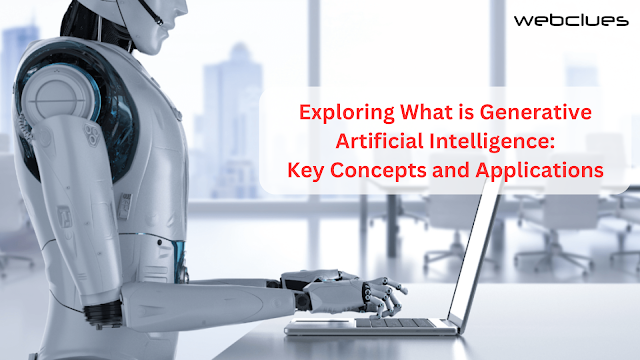Understanding Generative AI:
Generative AI operates on the principles of neural networks, particularly generative models such as Generative Adversarial Networks (GANs) and Variational Autoencoders (VAEs). These models are trained on vast datasets and learn to generate new content by deciphering the underlying patterns and structures present in the data.
GANs, introduced by Ian Goodfellow and his colleagues in 2014, consist of two neural networks: the generator and the discriminator. The generator creates synthetic data, such as images, while the discriminator evaluates its authenticity. This interplay exemplifies the essence of generative artificial intelligence, where machines are not just learning data but are creating entirely new instances that mirror the complexity of real-world information.
Meanwhile, VAEs are tasked with learning the underlying latent space of the data. They compress the data into a lower-dimensional representation and then reconstruct it, allowing for the generation of new data points that are variations on the original dataset, yet still retain its fundamental characteristics. This is what is generative artificial intelligence all about, understanding and creatively reimagining the data’s latent possibilities.
Applications of Generative AI:
Art and Creativity: Generative AI has revolutionized the creative process by providing artists with powerful tools to explore new realms of expression. From generating artwork and music to designing virtual environments, artists can leverage generative models to inspire their creativity and push the boundaries of traditional art forms.
Content Generation: In the era of digital content creation, generative AI plays a crucial role in producing vast amounts of diverse content efficiently. Whether it's generating realistic images for advertisements, writing product descriptions, or composing music for multimedia projects, generative models streamline content generation processes and enable personalized experiences for users.
Drug Discovery and Material Design: Generative AI holds immense potential in accelerating drug discovery and material design processes. By generating molecular structures with desired properties, researchers can expedite the search for new drugs and materials, leading to breakthroughs in healthcare, renewable energy, and materials science.
Natural Language Processing (NLP): In NLP, generative models have made significant strides in text generation, dialogue systems, and language translation. Models like OpenAI's GPT (Generative Pre-trained Transformer) series excel in generating human-like text based on context, enabling applications such as chatbots, content summarization, and language translation.
Computer Vision: Generative AI has also revolutionized computer vision applications, particularly in image synthesis and manipulation. From generating photorealistic images to enhancing low-resolution photos and even creating deepfakes, generative models are reshaping the way we perceive and interact with visual content.
Simulation and Gaming: In the gaming industry, generative AI is employed to create immersive virtual worlds, lifelike characters, and dynamic narratives. By generating realistic environments and responsive non-player characters (NPCs), generative models enhance the gaming experience and enable developers to create vast, procedurally generated worlds.
Challenges and Ethical Considerations:
Despite its transformative potential, generative AI also presents significant challenges and ethical considerations. Issues such as data privacy, bias in generated content, and the potential misuse of AI-generated media raise concerns about the responsible development and deployment of generative AI technologies. Moreover, ensuring transparency and accountability in AI-generated content is essential to maintain trust and mitigate the risks associated with misinformation and manipulation.
In conclusion, generative AI represents a groundbreaking advancement in artificial intelligence, enabling machines to exhibit creativity and produce novel content across various domains. As researchers continue to innovate and refine generative models, the potential applications of this technology are limitless, promising to reshape industries, enrich human experiences, and drive innovation in the years to come. However, it is imperative to address the challenges and ethical considerations associated with generative AI to ensure its responsible and beneficial integration into society. So why wait, join us at WebClues Infotech as we navigate the exciting frontier of generative artificial intelligence. Discover how our expertise can transform your business, enhance creativity, and unlock new possibilities. Are you ready to explore what is generative artificial intelligence and harness its potential? Connect with us today!


0 Comments